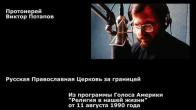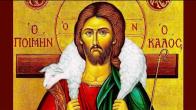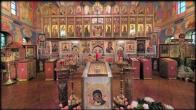You are here
Righteous St. Alexis of Moscow (Metchev)
29 January /11 February (Synaxis of the New Martyrs),
9/22 June, 20 August/2 September (Saints of Moscow)
16/29 September (Translation of the Relics)
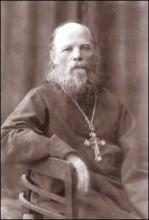 A Muscovite elder living in the world, Fr. Alexei Metchev was born on March 17, 1859, into the family of the pious choir director of the Chudov Cathedral Church.
A Muscovite elder living in the world, Fr. Alexei Metchev was born on March 17, 1859, into the family of the pious choir director of the Chudov Cathedral Church.
In childhood, his father, Alexis Ivanovitch Metchev, son of an archpriest of the Kolomenskoye District, had been saved from freezing to death on a cold winter night by Holy Hierarch Metropolitan Philaret of Moscow and Kolomenskoye. One of the young boys of the diocese selected for their musical aptitude, he was brought late one evening to Trinity Street, across from the metropolitan metochion. As the children were dining, Vladyka Metropolitan suddenly became worried, hurriedly dressed, and went out to look at the transport vehicles. In one of the sleighs, he found a sleeping boy who, through some oversight, had been left there in the cold. Seeing this occurrence as God’s providence, Metropolitan Philaret accorded special attention and assistance to the child he had rescued; from that point on, he took special care of both him and his family.
The circumstances of Fr. Alexis’s birth were remarkable. As his mother, Alexandra Dimitrievna, went into labor, she began to feel great pain. Her labor was quite prolonged and difficult, and the lives of both mother and child were in danger.
In great sorrow, Alexis Ivanovitch went to pray at the Monastery of St. Alexis, where Metropolitan Philaret was serving on the occasion of its patronal Feast. Going into the Altar, he stood quietly to the side, but Vladyka saw his favorite choir director’s suffering in his pained expression. He asked, “What is the matter? You are so downcast today.” “Your Eminence, my wife is in labor, and is dying.” The holy hierarch prayerfully crossed himself. “Let us pray together…God is merciful; everything will be all right,” he said. Then he handed him a prosphora and said, “A boy will be born. Name him Alexei, in honor of St. Alexis, Man of God, whom we celebrate today.”
Encouraged, Alexei Ivanovitch stayed for the Liturgy, and returned home filled with hope. At the gates, he received the joyous news that a son had been born.
In the two-room apartment on Trinity Street in which the family of the director of the Chudov Choir dwelt, a living faith in God, manifested in a ready bread-and-salt welcome of joyous hospitality, ruled. There they lived through the joys and sorrows of anyone whom God brought into their home. It was always crowded with people – friends and relative were always stopping by in the knowledge that there they would find help and consolation.
All his life, Fr. Alexei remembered his mother’s selfless action in taking in her sister and her three children after the death of her sister’s husband – this despite the fact that with three children of her own (sons Alexei and Tikhon, and daughter Barbara) the apartment was already crowded. The children were forced to erect loft sleeping benches.
Of all the brothers and cousins, Lyonya, as Alexei was known in the family, was distinguished by a tender heart and a quiet, peace-loving personality. He did not like to argue, wanted things to be good for everyone, and loved to make people happy, to comfort them, and to joke with them. All this he did piously. While visiting others, while playing in children’s rooms, he would suddenly become serious, and would go off by himself and hide, closing himself off from the noisy entertainment. As a result, his companions took to calling him “blessed Alyoshen’ka.”
Alexei Metchev studied at first in the Zaiconospassky School , and then in the Moscow Theological Seminary. He was a diligent, attentive, and thoughtful student, always ready to be of service in any way possible. He graduated from the Seminary without having had what is so essential for one who is studying: his own place in which to study. He often had to get up at night simply to prepare his lessons.
Along with many of his classmates, Alexei Metchev dreamed of going to the university and becoming a doctor. However, his mother firmly opposed such a plan, for she preferred that he be a man of prayer. She resolutely announced, “You are so small. Why should you become a doctor? It would be better for you to become a priest.”
It was hard for Alexei to give up his dream: he imagined that working as a physician was the most productive way to serve others. He tearfully bid his friends farewell, but he could not oppose his mother’s will, the will one whom he so respected and loved. Later batiushka came to understand that he had found his true calling, and was very thankful to his mother for having been able to do so.
On graduating from the seminary on October 14, 1880, Alexei Metchev was appointed cantor of the Church of Our Lady of the Sign, Prechistenskoye Forty on Znamenka Street . He was fated to undergo difficult trials there.
The parish rector was a man with a stern cast of mind, always ready to find fault. He demanded of the cantor that he also perform the duties of a watchman. He treated him roughly, and would even beat him, sometimes threatening him with a poker. When Alexei’s younger brother Tikhon would visit him, he would often find him in tears. Sometimes the deacon would stand up for the defenseless cantor, who endured everything in silence, never complaining or asking for a transfer to a different church. Later, he would thank the Lord that He had allowed him to receive such an education, and he would remember Fr. George, the rector, as his instructor.
On hearing of Fr. George’s death, Fr. Alexis, who by then was already a priest, came to the funeral. Those who knew how the deceased had treated him were amazed to see that as he escorted the body to the grave, his eyes brimmed with tears of love and thanks [to Fr. George].
In 1884, Alexei Metchev married Anna Petrovna Molchanova, the eighteen-year-old daughter of a cantor. On November 18 of the same year, Alexei was ordained to the diaconate.
As a clergyman, Deacon Alexei had a passionate dedication to the Lord, and displayed enormous humility, meekness, and lack of guile. His marriage was a happy one. Anna loved her husband and was of one mind with him in all things. However, she suffered from a serious cardiac condition, and her health became a matter of constant concern to him. In his wife, Fr. Alexei could see both his close friend and his closest helper along his path to Christ. He valued his wife’s friendly criticisms, and paid heed to them as one would listen to his elder, immediately striving to correct deficiencies she had noted.
Children were born into the family: Alexandra (1888), Anna (1890), Alexei (1891) – who died in his first year – Sergei (1892), and Olga (1896).
On March 19, 1893, Bishop Nestor, Administrator of Moscow’s Novospassky Monastery, ordained Deacon Alexei Metchev a priest for service at the Church of St. Nicholas the Wonderworker in Klenniki of the Stretensky Forty. The ordination took place at the Zaiconospassky Monastery. The Church of St. Nicholas the Wonderworker in Klenniki on Maroseika was not a large church, and its congregation was extremely small. Nearby, there were larger churches, which enjoyed greater attendance.
Upon becoming the rector of the Church of St. Nicholas , Fr. Alexei introduced daily services – at a time when it was usual for small Muscovite churches to have services only two or three times per week.
Batiushka would come alone to unlock the church at about 5:00 AM. He would not wait for other clergy to arrive, but after piously venerating the Miraculous Fyodorovskaya Icon of the Mother of God and the other icons, he would prepare everything needed for the Eucharist, and would serve the Proskomedia. At the appointed time, he would begin Matins, at which he would do the reading and chanting himself. The Liturgy followed. “For eight years, I served the Liturgy daily, in an empty church,” Batiushka was later to say. “A certain archpriest would say to me, ‘No matter whenever I should be passing your church, bells would be ringing. I would walk into the church, and find it empty.... Nothing is going to work out for you; it is pointless for you to ring the bells.’” But that did not trouble Fr. Alexei, and he continued to serve. At the time, Muscovites had the custom of coming to Confession and Communion but once a year, during Great Lent. However, in the “Nikola-Klenniki” Church on Maroseika Street one could confess and commune on any day of the year. In time, that fact became known throughout Moscow . There is a recorded account of an incident in which a city police officer on patrol at a very early hour noticed a woman behaving strangely on the banks of the Moscow River . On questioning the woman and learning that she had been driven to despair by life’s hardships and was planning to drown herself, he persuaded her to give up her plan and instead to go see Fr. Alexei on Maroseika Street. People in mourning, people burdened with life’s sorrows, the disheartened and dejected, were all drawn to that church. It was through them that news of the kind rector spread.
At that time, life for the clergy of the many small parishes was financially difficult, and often the circumstances of daily life were no better. The tiny wooden cottage in which Fr. Alexei’s family lived was very old, in severely deteriorated condition. Two-storey houses on either side blocked its windows. In the rainy season, streams of water running down from Pokrovka to Maroseika leaked into the church yard and into the cottage basement; their living quarters were always damp and humid.
Matushka Anna Petrovna was extremely ill. She developed cardiac edema, with marked swelling and tortured shortness of breath. Anna Petrovna reposed on August 29, 1902, the day of the Beheading of St. John the Forerunner and Baptizer of the Lord.
At the time, Alexei and Claudia Belov, merchants who were good friends of Fr. Alexei, had invited Righteous John of Kronstadt, who happened to be in Moscow , to visit them. They had dealings with Fr. John regarding charitable activities, but also arranged the visit so that Fr. Alexei could meet him.
When Fr. John entered, Fr. Alexei asked him, “Have you come to share my sorrow?” “I did not come to share in your sorrow, but in your joy,” answered Fr. John, “for you are being visited by the Lord. Leave your cell and come out to the people. It is only from this moment that you will begin to live. You are enjoying your sorrow and thinking that there is no sorrow on earth greater than yours.... But be with the people, enter into others’ sorrow, take it upon yourself, and you will see that in comparison to the general sorrow, your misfortune is insignificant; then your burden will ease.”
God’s grace, which rested so on the Kronstadt pastor, illumined anew life’s path for Fr. Alexei. He took what he had been told as an obedience. Unquestionably, his many years of truly ascetic life prepared him to receive the grace of eldership.
With sincere hospitality, love, and compassion, Fr. Alexei would greet all those who came to the church on Maroseika for help, people who had been enfeebled and broken by difficult circumstance, by mutual enmity, people sullied by sin, people who had forgotten God. Into their souls were instilled the joy and peace of Christ, hope in God’s mercy, and hope in the possibility of the renovation of the soul. The love that was shown toward each of them evoked in each the sensation that he was the person loved, pitied, and comforted most of all.
In the living quarters beneath the church, batiushka opened an elementary parish school and a refuge for orphans and for children of indigent parents. There, the children would also learn useful crafts. Over the course of 13 years, Fr. Alexei taught the children the Law of God in E. V. Vinclair’s private school.
One of his spiritual children, named Maria, had come to his church as a young girl shortly after her father’s death. In giving Maria his blessing to write icons, Fr. Alexei gave the impetus to a coming renaissance of ancient traditional Russian iconography, something that for several centuries had been forgotten, supplanted by painting.
Fr. Alexei began to hold services not only in the mornings, but in the evenings as well (Vespers and Matins).
Fr. Alexei prayed without ceasing. By his example, Batiushka demonstrated that in the everyday noise and vanity of life in the city, it was possible to be far from everything earthly, to have unceasing prayer and a pure heart, and to be able to stand before God, here on earth.
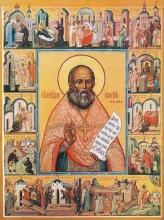 The numbers of the faithful attending the church grew ever larger, especially after 1917, when those who had abandoned the Church experienced a multitude of woes and hurried to the churches in hope of obtaining God’s help. After the Kremlin was shut down, some of the parishioners and choristers of the Chudov Monastery received a blessing from Vladyka Arseny (Zhadanovsky) to attend Fr. Alexei’s church. A substantial number of young people and students also appeared. They had seen that instead of bringing promised benefits, the Revolution had brought new misfortunes; now they were bent on acquiring the laws of spiritual life.
The numbers of the faithful attending the church grew ever larger, especially after 1917, when those who had abandoned the Church experienced a multitude of woes and hurried to the churches in hope of obtaining God’s help. After the Kremlin was shut down, some of the parishioners and choristers of the Chudov Monastery received a blessing from Vladyka Arseny (Zhadanovsky) to attend Fr. Alexei’s church. A substantial number of young people and students also appeared. They had seen that instead of bringing promised benefits, the Revolution had brought new misfortunes; now they were bent on acquiring the laws of spiritual life.
During those years, dedicated and educated young priests and deacons began to serve on Maroseika; among them was Fr. Alexei’s son Sergei Metchev, who was ordained to the priesthood on Great Thursday, 1919. They also assisted in giving lectures, having discussions, and organizing Theology classes. Nonetheless, Fr. Alexei’s burden grew ever larger. Far too many people sought out his counsel and wanted his blessing for various things. Even before, Batiushka had had to receive some of his parishioners in an apartment in the rectory, which had been built before World War I by the famous publisher I.D. Sytin. Now there were endless lines of people at the entrance to the little house. In the summer, people would even spend the night in the church courtyard.
Among Fr. Alexei’s true friends were his contemporaries, spiritual strugglers of Optina: Elder Hieroschemamonk Anatoly (Potapov) and Abbot Theodosy, prior of the skete. Fr. Anatoly would direct the Muscovites who visited him to go to Fr. Alexei. Elder Nektary would say to people, “Why do you journey to see us? You have Fr. Alexei.”
Most Holy Patriarch Tikhon, who always took Batiushka’s opinion into account in matters of ordination, proposed that he take on the challenge of uniting the clergy of Moscow. Meetings would be held in the Church of Christ the Savior, but under the circumstances of the times, they were soon terminated. Clergy attitudes toward Batiushka were varied. Many recognized his authority, some pastors were his spiritual children and followers, but many others were among his critics.
In the closing days of May (N.S.) 1923, Fr. Alexei went, as he had done in years past, to rest in his little cottage in Verey, a remote little town in Moscow District. Before his departure, he served his final Liturgy in the church on Maroseika Street, said goodbye to his spiritual children, and on leaving, said goodbye to the church. Fr. Alexei reposed on Friday June 9/22, 1923. On the final evening of his life, he was joyous, was affectionate toward everyone, and remembered all those who were not present, especially his grandson Alyosha. Death came the moment he lay down in bed.
The coffin with Fr. Alexei’s body was brought on horseback to the Church of St. Nicholas the Wonderworker in Klenniki at 9:00 AM on Wednesday June 14/27. One after another, Moscow’s parish communities and their pastors came to sing Panikhidas and to say goodbye to the reposed. To give everyone who came an opportunity to pray, this continued until the following morning. In the evening, two requiem Vigils were served: one in the church, and the other outdoors. The Liturgy and Funeral were served by a host of clergy, headed by Archbishop Fyodor (Pozdeyevsky), prior of the Danilov Monastery; in a letter written shortly before his death, Fr. Alexei had requested that he serve. At the time, Vladyka Fyodor was in prison, but was released on June 7/20, and was able to fulfill Batiushka’s request.
Paschal hymns were sung all along the route to the cemetery. Most Holy Patriarch and Confessor Tikhon, who had just been released from incarceration, came to escort Fr. Alexei on his final journey to the Lazarus Cemetery. He was ecstatically greeted by the crowds, fulfilling Batiushka’s prophetic words, “When I die, there will be joy for everyone.”
Ten years later, the Lazarus Cemetery was shut down, and on September 15/28, the relics of Fr. Alexei and his wife were moved to the “Vvedenskie Gory” Cemetery, known among the people as the “German Cemetery.” Fr. Alexei’s body remained substantially incorrupt; there was damage to one ankle joint, causing the foot to become separated from the leg.
According to the cemetery administration, for all the ensuing decades, Fr. Alexei’s grave was the most visited in the cemetery. Thanks to the oral accounts – and later, published accounts – of aid received from Fr. Alexei, many people learned of Fr. Alexei and, asking his intercession in their woes and difficulties in life, were comforted by him.
On a regular basis, earth had to be added to Fr. Alexei’s grave, as visitors seeking his help would take some of the earth home with them....
On the first anniversary of Fr. Alexei’s death, the members of the Maroseika community were invited to write about their encounters with Batiushka, and many people responded. Their reminiscences were not all of equal value, but some attested to instances of clairvoyance, examples of miracles, wonders, and prayerful assistance from the Elder.
At the Jubilee Bishop’s Council of 2000, Archpriest Alexei Metchev, an Elder in the world, was added to the list of Saints of the Russian Orthodox Church who are venerated by the entire Church.
Currently, the relics of Righteous St. Alexei Metchev are in Moscow , in the Church of Holy Hierarch St. Nicholas in Klenniki. By God’s mercy, there is a small piece of his holy relics in our church.
FR. ALEXEI METCHEV’S ADVICE TO A YOUNG LADY
Sometimes the Ustav calls for not doing full prostrations on certain Feasts, e.g. before Pentecost. What about other Feasts?
Here is what I would say about that: Sometimes you feel unworthy to look upon an icon, upon the face of the Lord. How can you then not do a full prostration? I, for example cannot fail to bow down to the ground when they sing “Let us worship the Father, Son and Holy Spirit…” (Vigil on the Eve of Sunday). Not to refrain is not a sin, but to do a prostration is a sin?
In opposition to questions from books during Confession – A certain person told me that he had read about some sin in a book, that he did not understand what it was, and then began to do everything to somehow learn what it was. He bought and read various books, and ultimately not only comprehended the sin, but became an adherent of the sin. Thus, I do not approve of asking such questions. You do not know, and you do not need to know.
Against envy – It is not worth getting irritated, it is not worth it.... Wish everyone happiness, and you yourself will be happy.
PARISH LIFE
Address of our Cathedral
Subscribe to our mailing list
While all the materials on this site are copyrighted, you may use them freely as long as you treat them
with respect and provide attribution on the Russian Orthodox Cathedral of St.John the Baptist of Washington DC.



